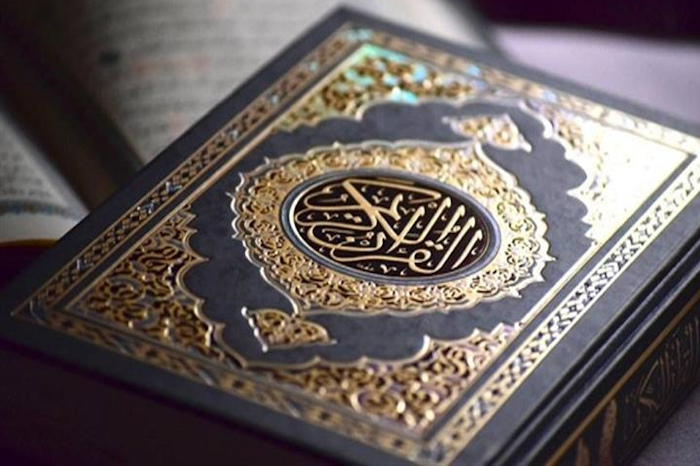بِسۡمِ اللّٰهِ الرَّحۡمٰنِ الرَّحِیۡمِ
وَالضُّحٰی ۙ﴿۱﴾ وَ الَّیۡلِ اِذَا سَجٰی ۙ﴿۲﴾ مَا وَدَّعَکَ رَبُّکَ وَ مَا قَلٰی ؕ﴿۳﴾ وَ لَلۡاٰخِرَۃُ خَیۡرٌ لَّکَ مِنَ الۡاُوۡلٰی ؕ﴿۴﴾ وَ لَسَوۡفَ یُعۡطِیۡکَ رَبُّکَ فَتَرۡضٰی ؕ﴿۵﴾ اَلَمۡ یَجِدۡکَ یَتِیۡمًا فَاٰوٰی ۪﴿٦﴾ وَ وَجَدَکَ ضَآلًّا فَہَدٰی ۪﴿۷﴾ وَ وَجَدَکَ عَآئِلًا فَاَغۡنٰی ؕ﴿۸﴾ فَاَمَّا الۡیَتِیۡمَ فَلَا تَقۡہَرۡ ؕ﴿۹﴾ وَ اَمَّا السَّآئِلَ فَلَا تَنۡہَرۡ ﴿ؕ۱۰﴾ وَ اَمَّا بِنِعۡمَۃِ رَبِّکَ فَحَدِّثۡ ﴿٪۱۱﴾
By the glorious morning light, and by the night when it becomes still. Your Rabb has neither forsaken you nor is He displeased with you. And surely the hereafter is much better for you than the present (life). And soon will your Rabb bestow you with such (abundant) favours that you will be pleased. Did He not find you as an orphan, then He granted you shelter? And did He not find you unaware (and unacquainted), then He showed you the way? And did He not find you in need, then He provided you with wealth. Then as for the orphan, then do not treat him with harshness; and as for the beggar, then do not repulse him; and as for the bounties of your Rabb, then go on mentioning (them).
In the early days of Islam, while Rasulullah (sallallahu alaihi wasallam) was in Makkah Mukarramah, he did not receive wahi from Allah Ta‘ala for a few days. Due to this, some of the kuffaar began taunting Rasulullah (sallallahu ‘alaihi wasallam) saying, “Your Rabb is displeased with you, therefore He is no longer sending wahi to you.”
These types of taunts and hurtful remarks will obviously cause pain to a person. However, Rasulullah (sallallahu ‘alaihi wasallam) had full conviction that Allah Ta‘ala is with him and has neither forsaken him nor is He displeased with him. Nevertheless, as a consolement for Rasulullah (sallallahu ‘alaihi wasallam) and as a lesson for his ummah, Allah Ta‘ala revealed this surah, wherein He explains that those who are devoted to the cause of Allah Ta‘ala and experience some type of difficulty, then they should never feel, for even a moment, that Allah Ta‘ala has forsaken them or that Allah Ta‘ala is displeased with them.
Hence, Allah Ta‘ala commences this surah with the following verses:
وَالضُّحٰی ۙ﴿۱﴾ وَالَّیۡلِ اِذَا سَجٰی ۙ﴿۲﴾ مَا وَدَّعَکَ رَبُّکَ وَ مَا قَلٰی ؕ﴿۳﴾
By the glorious morning light, and by the night when it becomes still. Your Rabb has neither forsaken you nor is He displeased with you.
In these aayaat, Allah Ta‘ala takes an oath by the glorious morning light and by the night when it becomes still. In this is an indication that man will go through different phases, and just as after the darkness of night comes the light of day, similarly, after a period of difficulty will come a period of ease.
Hence, when one goes through a phase of difficulty, he should not feel that Allah Ta‘ala is displeased with him or has forsaken him. Rather, one should turn to Allah Ta‘ala and remain obedient to Him at all times.
وَلَلۡاٰخِرَۃُ خَیۡرٌ لَّکَ مِنَ الۡاُوۡلٰی
And surely the hereafter is much better for you than the present (life).
The meaning of this aayat is that the life of the Hereafter is better for Rasulullah (sallallahu ‘alaihi wasallam) than the life of this world. However, it can also mean that every coming moment of the life of Rasulullah (sallallahu ‘alaihi wasallam) will be better than the preceding moments.
In other words, this is a special glad tiding for Rasulullah (sallallahu ‘alaihi wasallam), that Allah Ta‘ala will continue to bless him and increase him in knowledge, His special recognition and gaining further proximity and closeness to Allah Ta‘ala. In this, there is also an indication towards an improvement in his livelihood, honour and leadership.
Nevertheless, just as this verse contains special glad tidings for Rasulullah (sallallahu ‘alaihi wasallam), it is also a means of encouragement for every righteous believer to always remain hopeful of the special mercy of Allah Ta‘ala.
If a believer remains committed to following the blessed sunnah of Rasulullah (sallallahu ‘alaihi wasallam) in his life, and he strives to acquire the special proximity of Allah Ta‘ala, then every coming moment will be better for him than his past, as Allah Ta‘ala will continue to grant him increase and progress in his understanding, knowledge, respect and every other aspect.
Hence, when he undergoes any hardship or difficulty then he should not grieve and lose hope, but should rather turn to Allah Ta‘ala and have hope in His mercy.
وَلَسَوۡفَ یُعۡطِیۡکَ رَبُّکَ فَتَرۡضٰی
And soon will your Rabb bestow you with such abundant favours that you will be pleased.
In this verse, Allah Ta‘ala informs His beloved Rasul (sallallahu ‘alaihi wasallam) that He will fulfil his wishes and desires until he (sallallahu ‘alaihi wasallam) will become pleased. Among the wishes and desires of Rasulullah (sallallahu ‘alaihi wasallam) was that Islam should progress and spread throughout the world and that the Muslims should gain victory over their enemies. All these are included among the special favours that Allah Ta‘ala promised.
It is mentioned in the Hadith that when this verse was revealed, Rasulullah (sallallahu ‘alaihi wasallam) said,
إِذًا وَاللَّهِ لَا أَرْضَى وَوَاحِدٌ مِنْ أُمَّتِي فِي النَّارِ
‘I will never be pleased while even one individual of my ummah is dwelling in Jahannum’.
From this, we gauge the intense love that Rasulullah (sallallahu ‘alaihi wasallam) had for his ummah, where he will not find pleasure and happiness so long as even one person of his ummah is burning in Jahannum. In other words, Rasulullah (sallallahu ‘alaihi wasallam) has so much of love for the ummah that he wishes to see each and every member of his ummah entering Jannah. Hence, on the Day of Qiyaamah, Rasulullah (sallallahu ‘alaihi wasallam) will intercede before Allah Ta‘ala for each and every ummati to enter Jannah.
Rasulullah (sallallahu ‘alaihi wasallam) has unimaginable love for his ummah. The love of Rasulullah (sallallahu ‘alaihi wasallam) for every ummati demands that we also show our loyalty and allegiance to him at all times. In this regard, two things are important and necessary.
The first is that we adhere to his mubaarak sunnah in all facets of our lives and completely abstain from all those things which are displeasing to him and which he prohibited us from. In this manner, through fully adhering to his mubaarak sunnah, we will be showing our full appreciation and gratitude to him.
The second is that we recite Durood Shareef in abundance, especially on Fridays. This will bring happiness to the mubaarak heart of Rasulullah (sallallahu ‘alaihi wasallam).
اَلَمۡ یَجِدۡکَ یَتِیۡمًا فَاٰوٰی
Did He not find you an orphan, then He granted you shelter?
Rasulullah (sallallahu ‘alaihi wasallam) was an orphan from the beginning of his life, as his father had passed away before his birth. His mother then passed away when he was six, after which his grandfather, Abdul Muttalib, had taken care of him until the age of eight, and thereafter, Abu Taalib cared for him until he was approximately fifty years of age.
As far as Abu Taalib is concerned, then he showed Rasulullah (sallallahu ‘alaihi wasallam) such love and affection that even a father would not have shown. In fact, everyone that had entered the life of Rasulullah (sallallahu ‘alaihi wasallam) showed him love that was far in excess of any fatherly or parental love. Again – this was from Allah Ta‘ala, that everybody who saw him took a liking for him and developed deep love for him.
وَوَجَدَکَ ضَآلًّا فَهَدٰی
And did He not find you unaware and unacquainted, then He showed you the way?
Before nubuwwah, Rasulullah (sallallahu ‘alaihi wasallam) was unaware of the details of the path of deen. Hence, Allah Ta‘ala blessed him with nubuwwah, taught him the details of the entire deen and showed him the path through which he will guide people to Allah Ta‘ala.
وَوَجَدَکَ عَآئِلًا فَاَغۡنٰی
And did He not find you in need, then He provided you with wealth
In this verse, Allah Ta’ala addresses Rasulullah (sallallahu alaihi wasallam), reminding him of His favour upon him, where he was raised as an orphan, with no wealth; then Allah Ta‘ala blessed him with wealth.
فَاَمَّا الۡیَتِیۡمَ فَلَا تَقۡهَرۡ
Then as for the orphan, then do not treat him with harshness.
Rasulullah (sallallahu ‘alaihi wasallam) had experienced the life of an orphan and he knew the feelings, thoughts and sentiments that pass through the mind and heart of an orphan. The orphan is such that he generally does not have anyone to show love and kindness to him. Therefore, Allah Ta’ala has promised great rewards for those who care for the orphan. The Hadith says that the best home is that home where an orphan is respected and taken good care of, and the worst home is the one in which the orphan is treated with cruelty, despised and not treated with kindness.
Hence, in this Aayat, Allah Ta‘ala commands Rasulullah (sallallahu ‘alaihi wasallam) and the ummah to treat the orphans kindly and compassionately and not to treat them harshly.
وَاَمَّا السَّآئِلَ فَلَا تَنْهَرْ
And as for the beggar, then do not repulse him.
In this verse, Allah Ta’ala says to Rasulullah (sallallahu alaihi wasallam) that if a beggar comes to you, then you should not repulse him. In other words, you should be kind and considerate towards him. In this way, your ummah will emulate you and be considerate towards the poor and destitute.
وَاَمَّا بِنِعۡمَةِ رَبِّکَ فَحَدِّثْ
And as for the bounties of your Rabb, then go on proclaiming (them)
In this verse, Allah Ta’ala addresses Rasulullah (sallallahu alaihi wasallam) and commands him to speak about the favours which Allah Ta’ala has bestowed upon him. Hence, from this verse, we come to know that mentioning the favours which Allah Ta’ala has blessed one with before people, out of gratitude to Allah Ta’ala, is permissible, on condition that one does not boast or attribute its acquisition to one’s own achievement, but regards it as the sheer grace of Allah Ta’ala upon him.
 Ihyaaud Deen An Effort to Revive Deen in Totality
Ihyaaud Deen An Effort to Revive Deen in Totality



